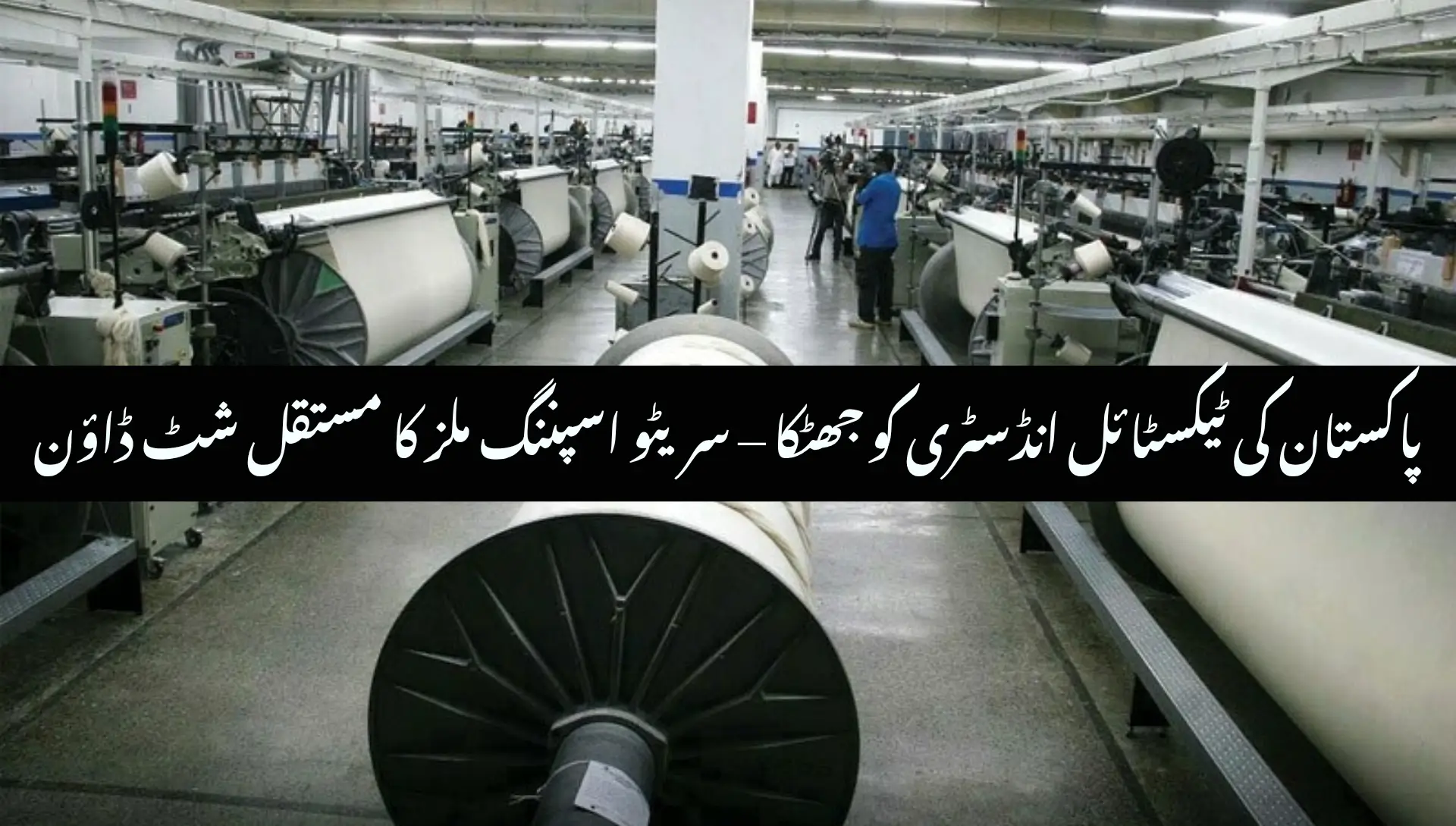Saritow Spinning Mills Closure: Key Insights on the Permanent Shutdown of Spinning Operations 2025. The question on many minds: What does the closure of the spinning operations at Saritow Spinning Mills Limited (SSML) in 2025 mean for the company and its stakeholders? In this article, we break down the permanent shutdown of SSML’s spinning mill business, the company’s pivot toward warehousing, and the wider implications for Pakistan’s textile sector and investors.
Saritow Spinning Mills Limited (SSML)
- Saritow Spinning Mills Limited, incorporated on March 10, 1987, under the Companies Ordinance, 1984.
- Headquartered in Lahore, Pakistan, with its manufacturing facility at Bhai Pheru, District Kasur, Punjab.
- The principal business until recently: manufacture and sale of cotton yarn.
- Listed on the Pakistan Stock Exchange (PSX) under ticker “SSML”.
Business Environment & Past Performance
- SSML operated in an environment of rising textile input costs, energy shortages and currency pressures common challenges across Pakistan’s spinning sector.
- Financial indicators showed mounting losses; a snapshot (Q3 2025) reveals negative EPS, shrinking margins and high liabilities.
What’s Changing – Shutdown Decision & New Strategy
The Decision to Close Spinning Operations
- On October 30, 2025, SSML announced that its Board approved the permanent shutdown of the spinning mill business which had been under suspension since 2024 due to ongoing losses.
- The move involves selling the plant and machinery valued at approximately PKR 411.93 million.
- The decision is subject to approval at an Extraordinary General Meeting (EOGM) scheduled for November 28, 2025.
Pivot to Warehousing – The New Business Model
- SSML plans to convert its idle factory buildings into warehousing facilities to generate rental income.
- Proceeds from asset sale will be used for:
- Partial refurbishment of factory premises for warehouse use
- Retirement of certain company liabilities
- Strengthening working capital for the new business line.
Key Dates & Approvals
| Date | Milestone |
|---|---|
| 2024 | Suspension of spinning operations |
| Oct 30 2025 | Board approval of closure and asset sale |
| Nov 28 2025 | EOGM for shareholder approval |
Why Is SSML Shutting Spinning Mill Operations?
Financial Losses & Unsustainable Operations
- SSML’s financials reveal negative profit after tax, sharp erosion in margins: e.g., net profit margin reported at around –3,110% for FY2025 as per available snapshot.
- Textile industry pressures: cotton price volatility, rising energy & utilities costs, global demand slowdown, exchange‐rate issues.
Strategic Rationale for Business Shift
- Spinning operations may no longer be viable given capital intensive nature, thin margins and heavy competition.
- Warehousing offers a less volatile business model: lower entry cost, recurring rental income, repurposing existing assets.
- By converting factory infrastructure into warehouses, SSML is attempting a turnaround via diversification.
Market & Sector Implications
- Reflects wider trend of textile companies in Pakistan adapting business models amid challenging textile‐spinning economics.
- For investors and industry watchers, the move signals shift in asset utilisation and strategic re‐orientation.
Impact on Stakeholders
Shareholders & Investors
- Shareholder value: Sale of plant & machinery and shift in business model may affect asset valuations, earnings‐per‐share outlook, and debt levels.
- Investor risk: Approval at EOGM is pending; outcomes and refurbishment success remain uncertain.
- For listed company, disclosure to PSX is mandatory; SSML has complied with notices.
Employees & Local Community
- Spinning mill shutdown implies job losses or reassignment as plant transitions to warehouse facilities.
- Local economy around Phool Nagar, Kasur may face shift—from manufacturing to warehousing employment dynamics.
Textile Supply Chain & Competitors
- Yarn suppliers, buyers and downstream textile units may adjust sourcing due to plant closure.
- Competitors in the spinning sector may benefit from reduced capacity; however, overall textile sector headwinds remain.
Detailed Breakdown – Spinning Closure vs Warehousing Pivot
Comparison Table
| Key Aspect | Spinning Mill Operations | Proposed Warehousing Business |
|---|---|---|
| Capital Intensity | High (machinery, labour, utilities) | Moderate (refurbishment, rental setup) |
| Revenue Model | Sale of yarn products | Rental income from warehouse leases |
| Risk & Cost Structure | High variable costs, commodity risk | Lower variable cost, stable rental contracts |
| Market Exposure | Subject to textile demand, global trends | More local/regional real‐estate dynamics |
| Time to Ramp/Scale | Long lead time, heavy maintenance | Quicker setup by repurposing existing assets |
| Strategic Focus | Manufacturing output, raw material sourcing | Asset management, real‐estate leasing |
Key Considerations and Risks
- The success of the warehouse model depends on demand for industrial/storage space in the region.
- SSML still holds legacy liabilities; asset sale proceeds must sufficiently cover debts and working capital needs.
- Stakeholder approval (EOGM) is a turning point; without it the plan may stall.
- Transition costs, renovation delays and market rental rates are variables to monitor.
What This Means for the Textile Sector in Pakistan
Trend Toward Capacity Rationalisation
The move by SSML underscores a larger pattern: smaller or less efficient spinning units are re‐evaluating viability amid cost pressures, meaning:
- Consolidation in spinning sector
- Shift toward integrated textile value chains or alternate asset uses
- Interest from real‐estate/re‐purposing firms in former industrial space
Investor Sentiment & Market Signals
For investors tracking the textile sector:
- Spinning companies with weak balance sheets may face closures or strategic pivots
- Asset‐rich textile firms could unlock value via repurposing property
- Market may reward companies demonstrating agility in business model transition
Regional Development Impacts
- Areas like Kasur, where SSML’s plant was located, may see a shift from manufacturing employment to logistics/warehousing jobs.
- Government policy, utilities & infrastructure may need to adapt from textile support toward logistics/inventory storage clusters.
FAQs
Q1: When will Saritow Spinning Mills permanently stop its spinning operations?
A1: The Board approved the permanent shutdown on October 30, 2025. Shareholder approval at the EOGM on November 28, 2025 is pending for final confirmation. ProPakistani+1
Q2: Why is SSML converting its factory buildings into warehousing facilities?
A2: Due to sustained losses in spinning operations and rising costs, SSML plans to repurpose its property into warehouse rental business—offering more stable income with lower operational complexity.
Q3: What is the estimated value of the plant and machinery being sold?
A3: The plant and machinery are valued at approximately PKR 411.93 million, as per the company’s announcement to PSX.
Q4: How will this decision impact SSML’s employees and local economy?
A4: The closure implies potential job losses in spinning operations; however, new warehousing business may offer alternative roles. The local economy may see a shift in nature of employment and industry presence.
Q5: What should investors in SSML watch now?
A5: Key factors: results of the EOGM on Nov 28, 2025; progress on asset sale and refurbishment; rental contracts and warehouse leasing success; and how proceeds are used to retire liabilities and strengthen working capital.
Conclusion
The decision by Saritow Spinning Mills Limited to permanently close its spinning operations and pivot to warehousing signifies a bold strategic shift in response to persistent losses and industry headwinds. By converting existing manufacturing assets into rental-income generating warehouses, SSML is attempting to re-align its business model for sustainability and value-creation. For investors, employees, and industry observers alike this move underscores the changing dynamics of Pakistan’s textile sector and the importance of agility in business strategy.


















